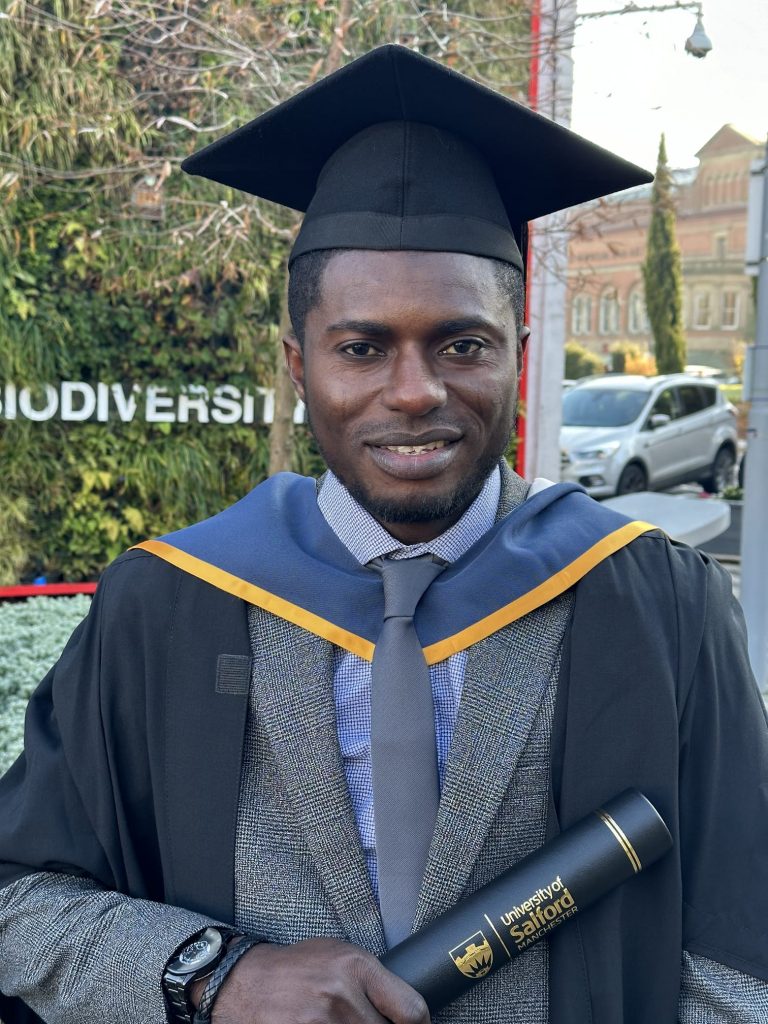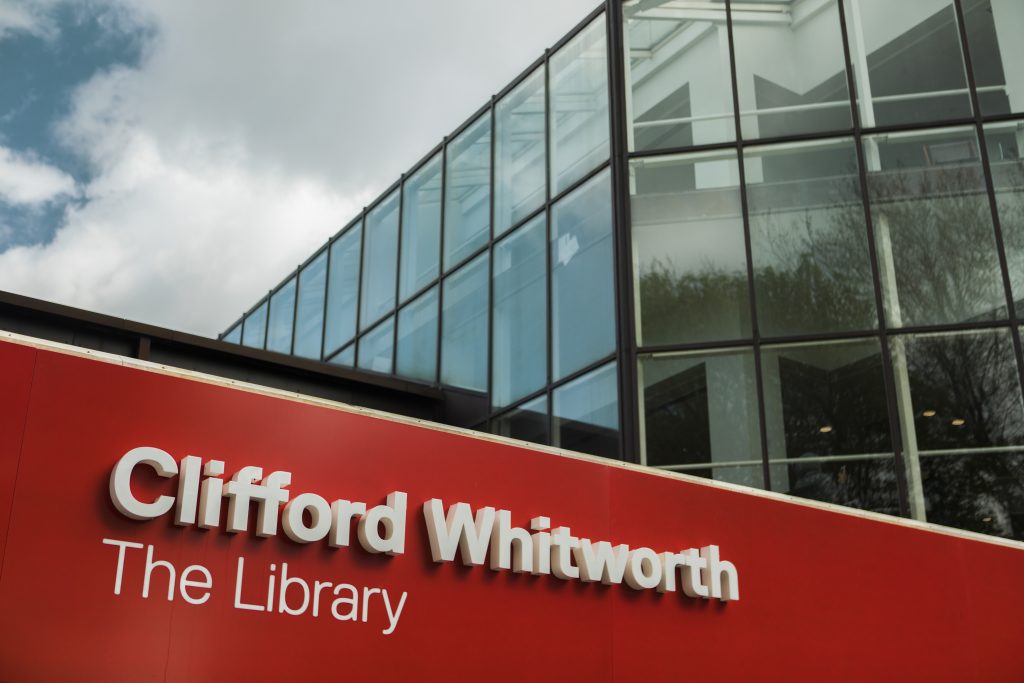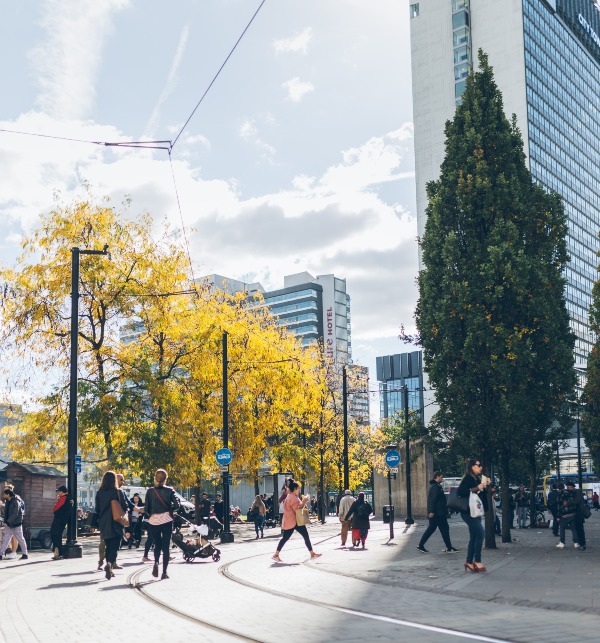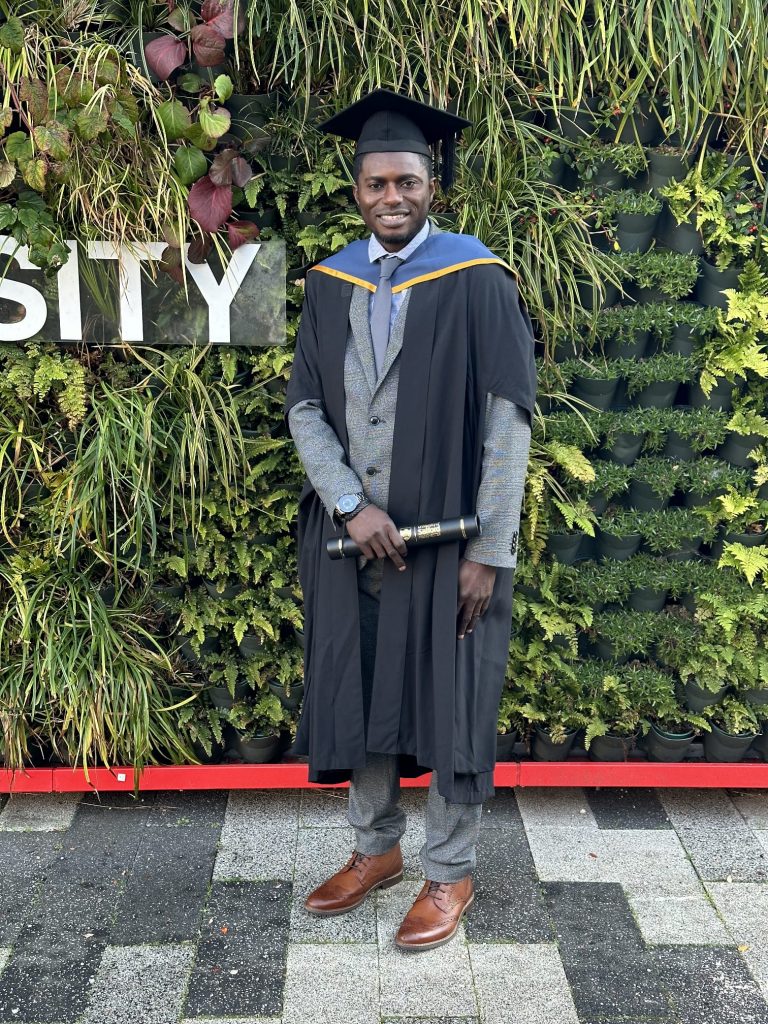Salford can be a place where you unlock your potential, and where you can use your studies to enact change in the world. This is certainly the case with courses from our School of Health and Society which focuses on a human-centred approach. A prestigious scholar, Kabiru Ajibola benefited from this approach as he came from Nigeria to study MSc Public Health in September 2022. We caught up with Kabiru to hear about his proudest moments from the course and how he settled in at Salford.

Why did you choose the University of Salford?
I chose the University of Salford for my postgraduate public health studies primarily due to its prestigious School of Health and Society and unparalleled location in Manchester – a diverse city which I am extremely fond of. As an ASPHER member institution, Salford’s public health curriculum meets rigorous European standards for education quality and real-world application. This ensures students get comprehensive training aligned with global public health priorities. ASPHER membership also provides access to an extensive network of international collaborators working at the forefront of the field.
Additionally, testimony from distinguished Salford alumni like Magdalene Wronska, Abolanle Gbadamosi (PhD students on 11/08/2021 and 27/2/2018, respectively), and Chuks Onwunyi who now hold leadership public health roles across the world, inspired my confidence in the programme’s ability to equip me for impactful practice post-graduation.
What did you think of the facilities and teaching at Salford?
I was highly impressed by the state-of-the-art facilities that provide crucial infrastructure for impactful knowledge. The one that left the strongest impression was the statistics teaching lab and the University library (Clifford Whitworth Library). This lab provides the ideal infrastructure for developing crucial data analysis competencies needed for impactful public health research and practice. Each student in the lab had access to their own high-powered desktop loaded with premium statistical software like SPSS, and R. This one-to-one hardware ratio enables personalised, hands-on learning by allowing students to actively work through their own data modelling, which cements conceptual knowledge into practical skillsets.
The modern, flexible library infrastructure including bookable study rooms with whiteboards and audiovisual technology facilitated rich self-directed learning – a key campus support system without which my academic achievements would not have flourished during this journey.

Beyond infrastructure, I was amazed by the interactive, collaborative teaching culture focused on real-world application. Seminars facilitated lively debate around current policy dilemmas and response strategies (I would like to express my appreciation to Dr Cathy Ure for taking us through the 21st Century Global Public Health Challenges course).
I advise all prospective and aspiring students from diverse disciplines to apply to the public health profession at the University of Salford. This will equip you with the expertise and connections to create your desired impact globally. You have boundless potential to unlock!
How did you settle into the city?
I found the transition to this new city to be quite smooth due to the walkable layout of the central districts near campus and thoughtful assistance from several gracious locals. Navigating the web of bustling pedestrian streets and exploring by foot introduced me to the vibrant culture, foods, and entertainment hubs that make this place special.
I fondly recall a friendly shopkeeper who guided me to the nearest African grocery store after noticing my confused map reading! Several fellow Nigerian students also welcomed me on my first day on campus with different gifts that helped me settle in.
Having these positive interactions and community connections early on aided my adjustment and made me feel like a home away from home.

Also, with lots of bus and tram stops nearby, I’ve enjoyed travelling to different galleries and historical sites too. Having access to so many cultural institutions, food/recreation sites, and transportation options within reach assured me I chose the perfect city to immerse myself in this new chapter.
Between the walkability of the city, welcoming people, and wealth of activities, I found my niche rather quickly. Surrounding myself with other Nigerians and international people sharing this experience has made the unfamiliar feel familiar. I know I’ll continue exploring the thriving scene here while forming lasting bonds of friendship.
What was your proudest moment on the course?

I felt immense pride in my group seminar presentation, which involved collaborating with classmates from four different countries to present hazardous waste as a 21st-century public health challenge. Our pooling of diverse expertise and reconciling of ideological differences to form cohesive final recommendations was deeply fulfilling.
On a personal level, I was tremendously proud that I persevered through a gruelling dissertation analysis sprint and submitted it within the deadline, after nearly conceding defeat. Through that test of resilience, I learnt how far mindset, organisational skills, and those who believe in you can carry you through. Completing that demanding milestone on the path of this degree continues to uplift me during times of darkness.
What was one of the highlights of your course?
One of the highlights of my MSc program was when our class took an excursion to the rural village of Eyam as part of a training exercise. Walking around the historic plague village with lecturers brought the sobering story to life in a profound way. Seeing the boundary stones marking the quarantine perimeter where residents sacrificed themselves to contain the 1665 plague outbreak was incredibly moving.
Discussing plague containment strategies used in the 1600s versus today with lecturers throughout the excursion provided valuable perspectives. The passion and knowledge they brought made the excursion engaging and meaningful.
This trip reinforced lessons from the simulation while expanding our understanding of past public health practices. Getting to explore Eyam’s story in situ rather than in a classroom, facilitated by lecturers as guides, created a powerful learning experience.
The excursion brought home the reality of putting public health principles into action in ways a textbook could not capture. Under our lecturers’ leadership, this immersive learning opportunity made history come alive while deepening perspectives on managing health crises.
What are your plans for the future?
I am excited to leverage my background in biomedical science and my new knowledge in public health to forge a meaningful career in improving healthcare and health outcomes.
My short-term goal is to secure a position as a public health scientist in either a health department or a respected research organisation. I am particularly looking at opportunities to apply my lab techniques and research skills in either pathology or immunology towards population health initiatives such as disease surveillance, control and prevention strategies and health promotion programmes.
My longer-term goal is to aim is to step into a leadership role managing public health lab testing operations or directing data-driven population health interventions for disadvantaged communities. I am also considering pursuing a PhD in epidemiology to open up opportunities in high-level public health research. With my blended expertise, I believe I can contribute to improving community health outcomes throughout my career.
Thanks for talking to us Kabiru, it was great to hear your story so far and we wish you the best of luck with your career. If you are interested in studying the same course as Kabiru, head to our MSc Public Health course page.